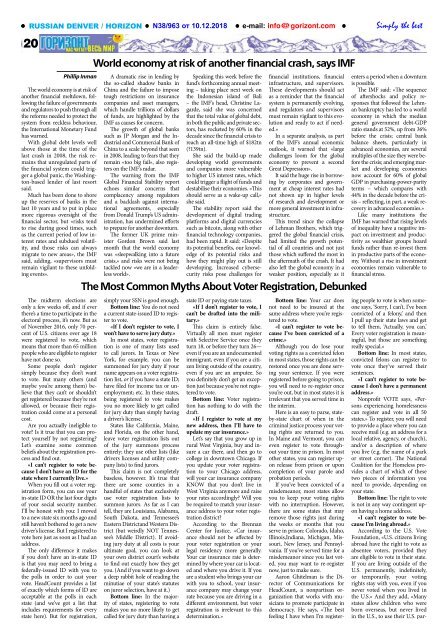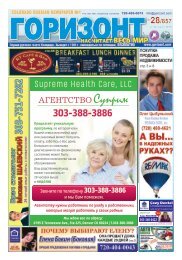Горизонт 38/963
Горизонт (газета) — (Gorizont англ. Horizon ) первая и наиболее влиятельная газета, издающаяся на русском языке в штатеКолорадо, США. Еженедельник, выходит по пятницам, формат Таблоид, 128 цветных и чернобелых страниц, распространяется в городах, составляющих метрополию Денвера (Большой Денвер), и в других населенных пунктах штата Колорадо от графства Саммит до графства Эль—Пасо. Полная электронная версия газеты «Горизонт» доступна в сети Интернет. Подробнее http://en.wikipedia.org/wiki/Gorizont_(newspaper)
Горизонт (газета) — (Gorizont англ. Horizon ) первая и наиболее влиятельная газета, издающаяся на русском языке в штатеКолорадо, США. Еженедельник, выходит по пятницам, формат Таблоид, 128 цветных и чернобелых страниц, распространяется в городах, составляющих метрополию Денвера (Большой Денвер), и в других населенных пунктах штата Колорадо от графства Саммит до графства Эль—Пасо. Полная электронная версия газеты «Горизонт» доступна в сети Интернет. Подробнее http://en.wikipedia.org/wiki/Gorizont_(newspaper)
Create successful ePaper yourself
Turn your PDF publications into a flip-book with our unique Google optimized e-Paper software.
RUSSIAN DENVER / HORIZON<br />
N<strong>38</strong>/<strong>963</strong> от 10.12.2018 e-mail: info@gorizont.com Simply the best<br />
20<br />
Phillip Inman<br />
The world economy is at risk of<br />
another financial meltdown, following<br />
the failure of governments<br />
and regulators to push through all<br />
the reforms needed to protect the<br />
system from reckless behaviour,<br />
the International Monetary Fund<br />
has warned.<br />
With global debt levels well<br />
above those at the time of the<br />
last crash in 2008, the risk remains<br />
that unregulated parts of<br />
the financial system could trigger<br />
a global panic, the Washington-based<br />
lender of last resort<br />
said.<br />
Much has been done to shore<br />
up the reserves of banks in the<br />
last 10 years and to put in place<br />
more rigorous oversight of the<br />
financial sector, but «risks tend<br />
to rise during good times, such<br />
as the current period of low interest<br />
rates and subdued volatility,<br />
and those risks can always<br />
migrate to new areas», the IMF<br />
said, adding, «supervisors must<br />
remain vigilant to these unfolding<br />
events».<br />
World economy at risk of another financial crash, says IMF<br />
A dramatic rise in lending by<br />
the so-called shadow banks in<br />
China and the failure to impose<br />
tough restrictions on insurance<br />
companies and asset managers,<br />
which handle trillions of dollars<br />
of funds, are highlighted by the<br />
IMF as causes for concern.<br />
The growth of global banks<br />
such as JP Morgan and the Industrial<br />
and Commercial Bank of<br />
China to a scale beyond that seen<br />
in 2008, leading to fears that they<br />
remain «too big fail», also registers<br />
on the IMF’s radar.<br />
The warning from the IMF<br />
Global Financial Stability report<br />
echoes similar concerns that<br />
complacency among regulators<br />
and a backlash against international<br />
agreements, especially<br />
from Donald Trump’s US administration,<br />
has undermined efforts<br />
to prepare for another downturn.<br />
The former UK prime minister<br />
Gordon Brown said last<br />
month that the world economy<br />
was «sleepwalking into a future<br />
crisis,» and risks were not being<br />
tackled now «we are in a leaderless<br />
world».<br />
Speaking this week before the<br />
fund’s forthcoming annual meeting<br />
– taking place next week on<br />
the Indonesian island of Bali<br />
– the IMF’s head, Christine Lagarde,<br />
said she was concerned<br />
that the total value of global debt,<br />
in both the public and private sectors,<br />
has rocketed by 60% in the<br />
decade since the financial crisis to<br />
reach an all-time high of $182tn<br />
(?139tn).<br />
She said the build-up made<br />
developing world governments<br />
and companies more vulnerable<br />
to higher US interest rates, which<br />
could trigger a flight of funds and<br />
destabilise their economies. «This<br />
should serve as a wake-up call,»<br />
she said.<br />
The stability report said the<br />
development of digital trading<br />
platforms and digital currencies<br />
such as bitcoin, along with other<br />
financial technology companies,<br />
had been rapid. It said: «Despite<br />
its potential benefits, our knowledge<br />
of its potential risks and<br />
how they might play out is still<br />
developing. Increased cybersecurity<br />
risks pose challenges for<br />
financial institutions, financial<br />
infrastructure, and supervisors.<br />
These developments should act<br />
as a reminder that the financial<br />
system is permanently evolving,<br />
and regulators and supervisors<br />
must remain vigilant to this evolution<br />
and ready to act if needed.»<br />
In a separate analysis, as part<br />
of the IMF’s annual economic<br />
outlook, it warned that «large<br />
challenges loom for the global<br />
economy to prevent a second<br />
Great Depression».<br />
It said the huge rise in borrowing<br />
by corporates and government<br />
at cheap interest rates had<br />
not shown up in higher levels<br />
of research and development or<br />
more general investment in infrastructure.<br />
This trend since the collapse<br />
of Lehman Brothers, which triggered<br />
the global financial crisis,<br />
had limited the growth potential<br />
of all countries and not just<br />
those which suffered the most in<br />
the aftermath of the crash. It had<br />
also left the global economy in a<br />
weaker position, especially as it<br />
The Most Common Myths About Voter Registration, Debunked<br />
enters a period when a downturn<br />
is possible.<br />
The IMF said: «The sequence<br />
of aftershocks and policy responses<br />
that followed the Lehman<br />
bankruptcy has led to a world<br />
economy in which the median<br />
general government debt-GDP<br />
ratio stands at 52%, up from 36%<br />
before the crisis; central bank<br />
balance sheets, particularly in<br />
advanced economies, are several<br />
multiples of the size they were before<br />
the crisis; and emerging market<br />
and developing economies<br />
now account for 60% of global<br />
GDP in purchasing-power-parity<br />
terms – which compares with<br />
44% in the decade before the crisis<br />
– reflecting, in part, a weak recovery<br />
in advanced economies.»<br />
Like many institutions the<br />
IMF has warned that rising levels<br />
of inequality have a negative impact<br />
on investment and productivity<br />
as wealthier groups hoard<br />
funds rather than re-invest them<br />
in productive parts of the economy.<br />
Without a rise in investment<br />
economies remain vulnerable to<br />
financial stress.<br />
The midterm elections are<br />
only a few weeks off, and if ever<br />
there’s a time to participate in the<br />
electoral process, it’s now. But as<br />
of November 2016, only 70 percent<br />
of U.S. citizens over age 18<br />
were registered to vote, which<br />
means that more than 65 million<br />
people who are eligible to register<br />
have not done so.<br />
Some people don’t register<br />
simply because they don’t want<br />
to vote. But many others (and<br />
maybe you’re among them) believe<br />
that they can’t or shouldn’t<br />
get registered because they’re not<br />
allowed, or because their registration<br />
could come at a personal<br />
cost.<br />
Are you actually ineligible to<br />
vote? Is it true that you can protect<br />
yourself by not registering?<br />
Let’s examine some common<br />
beliefs about the registration process<br />
and find out.<br />
«I can’t register to vote because<br />
I don’t have an ID for the<br />
state where I currently live.»<br />
When you fill out a voter registration<br />
form, you can use your<br />
in-state ID OR the last four digits<br />
of your social security number.<br />
I’ll be honest with you: I moved<br />
to a new state six months ago and<br />
still haven’t bothered to get a new<br />
driver’s license. But I registered to<br />
vote here just as soon as I had an<br />
address.<br />
The only difference it makes<br />
if you don’t have an in-state ID<br />
is that you may need to bring a<br />
federally-issued ID with you to<br />
the polls in order to cast your<br />
vote. HeadCount provides a list<br />
of exactly which forms of ID are<br />
acceptable at the polls in each<br />
state (and we’ve got a list that<br />
includes requirements for every<br />
state here). But for registration,<br />
simply your SSN is good enough.<br />
Bottom line: You do not need<br />
a current state-issued ID to register<br />
to vote.<br />
«If I don’t register to vote, I<br />
won’t have to serve jury duty.»<br />
In most states, voter registration<br />
is one of many lists used<br />
to call jurors. In Texas or New<br />
York, for example, you can be<br />
summoned for jury duty if your<br />
name appears on a voter registration<br />
list, or if you have a state ID;<br />
have filed for income tax or unemployment;<br />
etc. In these states,<br />
being registered to vote makes<br />
you no more likely to get called<br />
for jury duty than simply having<br />
a driver’s license.<br />
States like California, Maine,<br />
and Florida, on the other hand,<br />
leave voter registration lists out<br />
of the jury summons process<br />
entirely; they use other lists (like<br />
drivers licenses and utility company<br />
lists) to find jurors.<br />
This claim is not completely<br />
baseless, however. It’s true that<br />
there are some counties in a<br />
handful of states that exclusively<br />
use voter registration lists to<br />
summon jurors. As far as I can<br />
tell, they are Louisiana, Alabama,<br />
South Dakota, and Tennessee’s<br />
Eastern Districtand Western District<br />
(but weirdly NOT Tennessee’s<br />
Middle District). If avoiding<br />
jury duty at all costs is your<br />
ultimate goal, you can look at<br />
your own district court’s website<br />
to find out exactly how they get<br />
you. (And if you want to go down<br />
a deep rabbit hole of reading the<br />
minutiae of your state’s statutes<br />
on juror selection, have at it.)<br />
Bottom line: In the majority<br />
of states, registering to vote<br />
makes you no more likely to get<br />
called for jury duty than having a<br />
state ID or paying state taxes.<br />
«If I don’t register to vote, I<br />
can’t be drafted into the military.»<br />
This claim is entirely false.<br />
Virtually all men must register<br />
with Selective Service once they<br />
turn 18, or before they turn 26—<br />
even if you are an undocumented<br />
immigrant, even if you are a citizen<br />
living outside of the country,<br />
even if you are an amputee. So<br />
you definitely don’t get an exception<br />
just because you’re not registered<br />
to vote.<br />
Bottom line: Voter registration<br />
has nothing to do with the<br />
draft.<br />
«If I register to vote at my<br />
new address, then I’ll have to<br />
update my car insurance.»<br />
Let’s say that you grow up in<br />
rural West Virginia, buy and insure<br />
a car there, and then go to<br />
college in downtown Chicago. If<br />
you update your voter registration<br />
to your Chicago address,<br />
will your car insurance company<br />
KNOW that you don’t live in<br />
West Virginia anymore and raise<br />
your rates accordingly? Will you<br />
be required to match your insurance<br />
address to your voter registration<br />
district?<br />
According to the Brennan<br />
Center for Justice, «Car insurance<br />
should not be affected by<br />
your voter registration or your<br />
legal residency more generally.<br />
Your car insurance rate is determined<br />
by where your car is located<br />
and where you drive it. If you<br />
are a student who brings your car<br />
with you to school, your insurance<br />
company may change your<br />
rate because you are driving in a<br />
different environment, but voter<br />
registration is irrelevant to this<br />
determination.»<br />
Bottom line: Your car does<br />
not need to be insured at the<br />
same address where you’re registered<br />
to vote.<br />
«I can’t register to vote because<br />
I’ve been convicted of a<br />
crime.»<br />
Although you do lose your<br />
voting rights as a convicted felon<br />
in most states, those rights can be<br />
restored once you are done serving<br />
your sentence. If you were<br />
registered before going to prison,<br />
you will need to re-register once<br />
you’re out, but in most states it is<br />
irrelevant that you served time in<br />
the interim.<br />
Here is an easy to parse, stateby-state<br />
chart of when in the<br />
criminal justice process your voting<br />
rights are returned to you.<br />
In Maine and Vermont, you can<br />
even register to vote throughout<br />
your time in prison. In most<br />
other states, you can register upon<br />
release from prison or upon<br />
completion of your parole and<br />
probation periods.<br />
If you’ve been convicted of a<br />
misdemeanor, most states allow<br />
you to keep your voting rights<br />
with no interruption. However,<br />
there are some states that may<br />
remove those rights just during<br />
the weeks or months that you<br />
serve in prison: Colorado, Idaho,<br />
Illinois,Indiana, Michigan, Missouri,<br />
New Jersey, and Pennsylvania.<br />
If you’ve served time for a<br />
misdemeanor since you last voted,<br />
you may want to re-register<br />
now, just to make sure.<br />
Aaron Ghitelman is the Director<br />
of Communications for<br />
HeadCount, a nonpartisan organization<br />
that works with musicians<br />
to promote participate in<br />
democracy. He says, «The best<br />
feeling I have when I’m registering<br />
people to vote is when someone<br />
says, ‘Sorry, I can’t, I’ve been<br />
convicted of a felony,’ and then<br />
I pull up their state laws and get<br />
to tell them, ‘Actually, you can.’<br />
Every voter registration is meaningful,<br />
but those are something<br />
really special.»<br />
Bottom line: In most states,<br />
convicted felons can register to<br />
vote once they’ve served their<br />
sentences.<br />
«I can’t register to vote because<br />
I don’t have a permanent<br />
address.»<br />
Nonprofit VOTE says, «Persons<br />
experiencing homelessness<br />
can register and vote in all 50<br />
states.» To register, you will need<br />
to provide a place where you can<br />
receive mail (e.g. an address for a<br />
local relative, agency, or church),<br />
and/or a description of where<br />
you live (e.g. the name of a park<br />
or street corner). The National<br />
Coalition for the Homeless provides<br />
a chart of which of these<br />
two pieces of information you<br />
need to provide, depending on<br />
your state.<br />
Bottom line: The right to vote<br />
is not in any way contingent upon<br />
having a home address.<br />
«I can’t register to vote because<br />
I’m living abroad.»<br />
According to the U.S. Vote<br />
Foundation, «U.S. citizens living<br />
abroad have the right to vote as<br />
absentee voters, provided they<br />
are eligible to vote in their state.<br />
If you are living outside of the<br />
U.S. permanently, indefinitely,<br />
or temporarily, your voting<br />
rights stay with you, even if you<br />
never voted when you lived in<br />
the U.S.» And they add, «Many<br />
states allow children who were<br />
born overseas, but never lived<br />
in the U.S., to use their U.S. par-
















